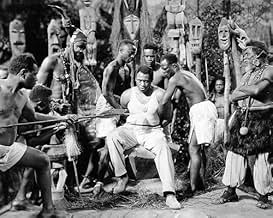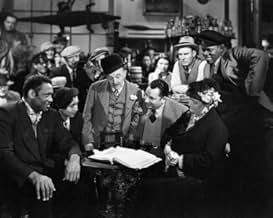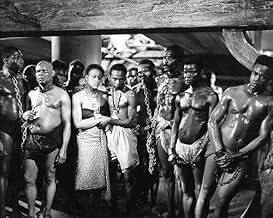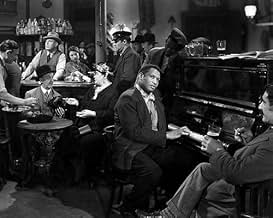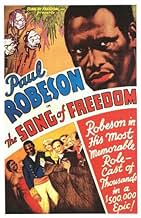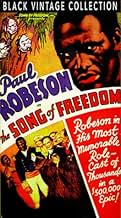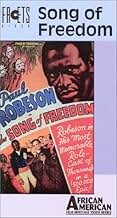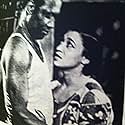अपनी भाषा में प्लॉट जोड़ेंA black British dockworker named Johnny Zinga becomes a famous singer and learns that he is the rightful king of the African island of Casanga.A black British dockworker named Johnny Zinga becomes a famous singer and learns that he is the rightful king of the African island of Casanga.A black British dockworker named Johnny Zinga becomes a famous singer and learns that he is the rightful king of the African island of Casanga.
Elisabeth Welch
- Ruth Zinga
- (as Elizabeth Welch)
Bernard Ansell
- Sir James Pyrie
- (as Bernerd Ansell)
Cornelia Smith
- Queen Zinga
- (as Miss C. Smith)
Sydney Benson
- Gate-Keeper
- (बिना क्रेडिट के)
Cathleen Cavanagh
- Woman
- (बिना क्रेडिट के)
Alf Goddard
- Alf, the Bartender
- (बिना क्रेडिट के)
फ़ीचर्ड समीक्षाएं
Although no-one could call this a great movie, it is of compelling historical interest. At a time when Black people in the movies were servants or scoundrels, Paul Robeson portrayed a London dock-worker who is discovered by an impresario and launches a great singing career; after that, he goes to Africa to bring education and enlightenment to the tribespeople.
It's easy to be harsh on this movie; it shows the people of Africa as benighted savages in need of guidance (only this time they get it from Robeson, playing an Afro-cockney). The whole second half plays in tropical-adventure mode, with all the clichés of the 1930s.
But you have to realize that the film's sympathies are with the London dock-workers, black and white; it goes to great lengths to show them treating each other with friendship and respect, and this is the most notable part of the story. Everyone else is a caricature - the impresario, the aristocratic explorer, the witch-doctor, and so on.
Anyone who has a tolerance for 1930s films will quickly realize that this is much better than most of them, and is worth a look for many reasons, not the least is the opportunity to hear Robeson's great singing voice. One curious fact is that this is from Hammer Studios, which later became identified with horror films.
A must see for anyone interested in cinema.
It's easy to be harsh on this movie; it shows the people of Africa as benighted savages in need of guidance (only this time they get it from Robeson, playing an Afro-cockney). The whole second half plays in tropical-adventure mode, with all the clichés of the 1930s.
But you have to realize that the film's sympathies are with the London dock-workers, black and white; it goes to great lengths to show them treating each other with friendship and respect, and this is the most notable part of the story. Everyone else is a caricature - the impresario, the aristocratic explorer, the witch-doctor, and so on.
Anyone who has a tolerance for 1930s films will quickly realize that this is much better than most of them, and is worth a look for many reasons, not the least is the opportunity to hear Robeson's great singing voice. One curious fact is that this is from Hammer Studios, which later became identified with horror films.
A must see for anyone interested in cinema.
This Hammer Studio, from London, England which is famous for its horror films surprised me with this great film from 1936 starring Paul Robeson, (John Zinga) who works as a London dock worker and sings songs all the time besides having a great bass voice for the opera and is discovered by a great opera director and producer from London, England. John is always wanting to go to Africa where he came from, but he does not know exactly where he was born, but he still remembers a song which he heard when he was very young. One day John happens to sing this song on stage in an opera performance and this song is recognized by an Englishman who tells him where it comes from and also a charm which John wears around his neck which helped determine its origin. John also has a wife and they both visit this Island and try to introduce themselves to these people and that is when the story gets very interesting. Don't miss this great film from the past, it is a gem in the rough. Enjoy
9tavm
In reviewing movies starring people of color in chronological order for Black History Month, we're now in 1936 when singer/actor Paul Robeson has one of his strongest roles yet on film. In this one, he's Johnny Zinga, a London dockworker whose constant singing during break time gets him the attention of impresario Gabriel Donozetti (Esme Percy) who offers him a chance to entertain in various concerts. He becomes successful but something pulls him back to his ancestral homeland in Africa and when someone confirms his heritage, he chucks his career to bring himself and his wife, Ruth (Elisabeth Welch) along with servant Monty (Robert Adams), there to claim his inherited royalty. But the native leader (James Solomon) there doubts him along with the rest of the tribe with the exception of Mandingo (Ecce Homo Toto). I'll stop there and just say this was dramatically satisfying from beginning to end and Robeson really carries the film on his own shoulders whether singing or reciting his lines. Ms. Welch herself has a nice singing voice as shown near the end. Some humor is also appreciated whenever Donozetti teaches some lessons to Johnny and since Monty is the same race as his superiors, his stereotypical antics is not as offensive as it would be with a Caucasian as his boss. So in summation, Song of Freedom is one of the most compelling films in Paul Robeson's career. P.S. One of his numbers is from the operatic version of "The Emperor Jones" as adopted musically by Louis Gruenberg. If you know about Mr. Robeson, you know his previous portrayal in the title role when it was originally a play and then later a movie.
This film made Paul Robeson proud, and it also garnered high approval from leading black intellectuals at the time, such as Langston Hughes. In its first half it's very easy to see why. The story is far-fetched, but it shows black people as regular folks amongst the working-class of London, without stereotypes, and the desire on the part of one of them (Robeson) to find out where his ancestors were from. In flashing through a couple of centuries, it also showed a sample of some of the horrors of slavery, and we see a clear link to how that caused Robeson's character to be tragically disconnected from his past.
Hearing Robeson perform six songs was quite a treat, and 5-stars on its own. The second, "Sleepy River," which we see with a montage of people listening to his wonderful voice at night, is particularly stirring. Meanwhile, Elisabeth Welch is such a cutey pie as his wife, and more importantly, she's also a real person and not some mammy/servant stereotype. We even get to hear her reprise the song "Sleepy River" at the end, which was wonderful.
The film falters a bit in its second half when Robeson's character makes his way back to his ancestral island, and discovers it run by superstitious, backward people. The characterization felt troublesome, particularly since Robeson seeks to improve their life with the advances he's learned growing up in a European culture, one the film shows to be superior in every respect. On the other hand, at least it's a black man who has come to do this, and a strong, talented, intelligent black man at that. There is something moving at the heart of wanting to find your ancestral land, and to help the people living there.
I might have knocked my rating down a bit because of the problematic bits, or because the interaction Robeson has with the Africans seemed so implausible, but I kept in mind the film was made in 1936. The contrast of Robeson and Welch's characters to what was being spewed out in Hollywood at the time for African-Americans is striking, and undeniable. I enjoyed watching them here, and for the film's musical numbers and the progress it represented, was glad I saw this.
Hearing Robeson perform six songs was quite a treat, and 5-stars on its own. The second, "Sleepy River," which we see with a montage of people listening to his wonderful voice at night, is particularly stirring. Meanwhile, Elisabeth Welch is such a cutey pie as his wife, and more importantly, she's also a real person and not some mammy/servant stereotype. We even get to hear her reprise the song "Sleepy River" at the end, which was wonderful.
The film falters a bit in its second half when Robeson's character makes his way back to his ancestral island, and discovers it run by superstitious, backward people. The characterization felt troublesome, particularly since Robeson seeks to improve their life with the advances he's learned growing up in a European culture, one the film shows to be superior in every respect. On the other hand, at least it's a black man who has come to do this, and a strong, talented, intelligent black man at that. There is something moving at the heart of wanting to find your ancestral land, and to help the people living there.
I might have knocked my rating down a bit because of the problematic bits, or because the interaction Robeson has with the Africans seemed so implausible, but I kept in mind the film was made in 1936. The contrast of Robeson and Welch's characters to what was being spewed out in Hollywood at the time for African-Americans is striking, and undeniable. I enjoyed watching them here, and for the film's musical numbers and the progress it represented, was glad I saw this.
It's sad that this sort of film simply could not have been made in Paul Robeson's home country at the time due to racism. Instead, Robeson went to the UK and made a few films--too few. I say this because he had a wonderful screen presence and his singing was gorgeous.
Robeson plays 'John Zinga'--a London dockworker descended from royalty back in Africa. Oddly, he lacks a British accent (while Robeson was a brilliant and multi-talented man, apparently a British accent was beyond him) and he has a weird sort of consciousness of his people and Africa within him. It goes far deeper than his interest in his cultural homeland--Robeson's character is fixated on the place and seems to have bits and pieces in the back of his mind about his homeland--though no one apparently ever told him about this--at least as far as he can remember. So, after becoming a huge singing star and learning more about the exact place in Africa where his forebears came from, he takes off for the place to get in touch with his roots.
The second portion of the film takes place an Zananga, Africa. There, Robeson is eventually recognized as a descendant of kings and brings culture, medicine and western civilization to these people--but it is a hard fight to get them to abandon their ineffective ways. It's nice that it's NOT a case of whites bringing this to these 'dark' people but a black man bringing this knowledge to them--making it seem a little less paternalistic. In many ways, this portion of the film seems like a call to other black men and women to return and contribute to their ancestral lands.
Overall, while the film might seem a bit old fashioned today, it really is a remarkable film in many ways. The most obvious is because of its unusual subject mater, but more important aspects should not be lost on the viewer. To have a mainstream film starring a strong and talented black man was very progressive for its day. And, seeing Robeson liked and respected by all as a person--even by his white co-workers. In many ways the film comes off as a bit overly ideal--absent is racism and in this film a good black man can achieve practically anything--a message that must have resonated in the black communities in the UK as well as back home in the States. A daring film and a great chance to see and hear an amazingly gifted man. For more on this, read his biography on IMDb--you'll see what I mean.
Robeson plays 'John Zinga'--a London dockworker descended from royalty back in Africa. Oddly, he lacks a British accent (while Robeson was a brilliant and multi-talented man, apparently a British accent was beyond him) and he has a weird sort of consciousness of his people and Africa within him. It goes far deeper than his interest in his cultural homeland--Robeson's character is fixated on the place and seems to have bits and pieces in the back of his mind about his homeland--though no one apparently ever told him about this--at least as far as he can remember. So, after becoming a huge singing star and learning more about the exact place in Africa where his forebears came from, he takes off for the place to get in touch with his roots.
The second portion of the film takes place an Zananga, Africa. There, Robeson is eventually recognized as a descendant of kings and brings culture, medicine and western civilization to these people--but it is a hard fight to get them to abandon their ineffective ways. It's nice that it's NOT a case of whites bringing this to these 'dark' people but a black man bringing this knowledge to them--making it seem a little less paternalistic. In many ways, this portion of the film seems like a call to other black men and women to return and contribute to their ancestral lands.
Overall, while the film might seem a bit old fashioned today, it really is a remarkable film in many ways. The most obvious is because of its unusual subject mater, but more important aspects should not be lost on the viewer. To have a mainstream film starring a strong and talented black man was very progressive for its day. And, seeing Robeson liked and respected by all as a person--even by his white co-workers. In many ways the film comes off as a bit overly ideal--absent is racism and in this film a good black man can achieve practically anything--a message that must have resonated in the black communities in the UK as well as back home in the States. A daring film and a great chance to see and hear an amazingly gifted man. For more on this, read his biography on IMDb--you'll see what I mean.
क्या आपको पता है
- ट्रिवियाPaul Robeson performs a scene from Louis Gruenberg's operatic version of "The Emperor Jones". He earlier had starred in Eugene O'Neill's original play on Broadway (1923) and in the film version The Emperor Jones (1933).
- भाव
Gabriel Donozetti: What's the matter the color of his skin, when he has color in his voice! Power! Beauty! I go fighting!
- कनेक्शनFeatured in That's Black Entertainment (1990)
टॉप पसंद
रेटिंग देने के लिए साइन-इन करें और वैयक्तिकृत सुझावों के लिए वॉचलिस्ट करें
विवरण
- रिलीज़ की तारीख़
- कंट्री ऑफ़ ओरिजिन
- भाषाएं
- इस रूप में भी जाना जाता है
- Un trono por una canción
- फ़िल्माने की जगहें
- उत्पादन कंपनी
- IMDbPro पर और कंपनी क्रेडिट देखें
- चलने की अवधि1 घंटा 20 मिनट
- रंग
- पक्ष अनुपात
- 1.37 : 1
इस पेज में योगदान दें
किसी बदलाव का सुझाव दें या अनुपलब्ध कॉन्टेंट जोड़ें


